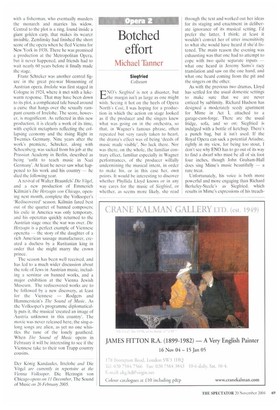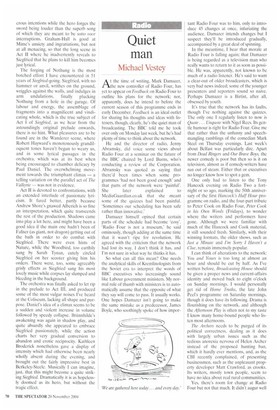Botched effort
Michael Tanner
Siegfried Coliseum
ENO's Siegfried is not a disaster, but JI—Lithe margin isn't as large as one might wish. Seeing it hot on the heels of Opera North's Cosi, I was hoping for a production in which the action on stage looked as if the producer and the singers knew what was going on in the orchestra, so that, in Wagner's famous phrase, often repeated but very rarely taken to heart, the drama's effect was of being 'deeds of music made visible', No luck there. Nor was there, on the whole, the familiar contrary effect, familiar especially in Wagner performances, of the producer wilfully undermining the musical intent, in order to make his, or in this case her, own points. It would be interesting to discover whether Phyllida Lloyd knows or in any way cares for the music of Siegfried, or whether, as seems more likely, she read
through the text and worked out her ideas for its staging and enactment in deliberate ignorance of its musical setting. I'd prefer the latter, I think; at least it wouldn't convict her of utter insensitivity to what she would have heard if she'd listened. The main reason the evening was exhausting was that one had to attempt to cope with two quite separate inputs — what one heard in Jeremy Sams's racy translation and saw on the one hand, and what one heard coming from the pit and the singers on the other.
As with the previous two dramas, Lloyd has settled for the usual domestic settings to make sure that we are never enticed by sublimity. Richard Hudson has designed a moderately seedy apartment for Mime in Act I, attached to a garage-cunt-forge. There are the usual fridge, sofa, and so on; Siegfried is indulged with a bottle of ketchup. There's a punch bag, but it isn't used. If the Royal Opera can sack a potential Ariadne, rightly in my view, for being too stout, I don't see why ENO has to go out of its way to find a dwarf who must be all of six foot four inches, though John Graham-Hall does sing Mime's music beautifully — a rare treat.
Unfortunately, his voice is both more powerful and more engaging than Richard Berkeley-Steele's as Siegfried, which results in Mime's expressions of his treach erous intentions while the hero forges the sword being louder than the superb song of which they are meant to be sotto voce interruptions. Graham-Hall is good at Mime's anxiety and ingratiations, but not at all menacing, so that the long scene in Act II where he inadvertently reveals to Siegfried that he plans to kill him becomes just lyrical.
The forging of Nothung is the most botched effort I have encountered in 51 years of Siegfried-going. Siegfried, with no hammer or anvil, writhes on the ground, wriggles against the walls, and indulges in arm undulations, finally plucking Nothung from a hole in the garage. Of labour and energy, the assemblage of fragments into a magnificent and vindicating whole, which is the true subject of Act I of Siegfried, as we hear from the astoundingly original prelude onwards, there is no hint. What pleasures are to be found are in the Wanderer scene, where Robert Hayward's monotonously grandiloquent tones haven't begun to weary us, and in some lyrical passages in the orchestra, which was at its best when being encouraged to chamber delicacy by Paul Daniel. The overwhelming movement towards the triumphant climax — a telling variation on the parallel act of The Valkyrie — was not in evidence.
Act II is devoted to confrontations, with an extended interlude of passionate lyricism. It fared better, partly because Andrew Shore's gnawed Alberich is so fine an interpretation, which quite transcends the rest of the production. Shadows came into play a lot here, and might have been a good idea if the main one hadn't been of Fafner (as giant, not dragon) getting out of the bath in order to do combat with Siegfried. There were even hints of Nature, while the Woodbird, too earthily sung by Sarah Tynan, cutely circled Siegfried on her scooter giving him his orders. There were, too, some agreeably grisly effects as Siegfried sang his most lovely music while corpses lay slumped and bleeding in the background.
The orchestra was finally asked to let rip in the prelude to Act III, and produced some of the most vulgar noises I've heard at the Coliseum, lacking all shape and purpose. Daniel's idea of a climax seems to be a sudden and violent increase in volume followed by speedy collapse. Briinnhilde's awakening was again in shadow play, and quite absurdly she appeared to embrace Siegfried passionately, while the action charts her very gradual conversion to abandon and erotic reciprocity. Kathleen Broderick nonetheless gave a display of intensity which had otherwise been nearly wholly absent during the evening, and brought out the fairly impressive best in Berkeley-Steele. Musically I can imagine, just, that this might become a quite striking Siegfried. Dramatically it is as hopelessly doomed as its hero, but without the tragic effect.



























































































 Previous page
Previous page